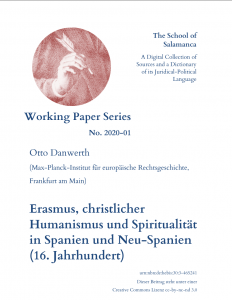We are happy to announce the publication of the latest instalment in our series „The School of Salamanca Working Papers“ (ISSN 2509-5080):
Otto Danwerth: ERasmus, christlicher Humanismus und Spiritualität in Spanien und Neu-Spanien (16. Jahrhundert)
(2020-01)
Abstract
The writings of Erasmus of Rotterdam (1466/69–1536) exerted a significant influence in 16th-century Spain. Based on classical and recent historiography, the present essay examines this religious and cultural phenomenon, with side glances at Luther: After sketching out the life and work of the Christian humanist, the second part deals with Erasmianism in Spain from its widespread reception in the 1520s (at the royal court, at universities and in translations) to the inquisitorial persecution of its followers since the 1530s. Thirdly, newer research trends are discussed that both correct and further develop the classical image shaped by Marcel Bataillon, also with regard to the ambivalent relationship between scholasticism and humanism. To demonstrate Erasmus’ influence in New Spain (Mexico), the final part of this essay turns its attention to the attitudes of (arch)bishops and friars as well as to early colonial case studies.
Keywords
Erasmus von Rotterdam, Martin Luther, Charles V, Philip II, Juan de Zumárraga, Vasco de Quiroga, Marcel Bataillon, 16th century, mission, spirituality, theology, Renaissance, Christian humanism, scholasticism, confessional age, Reformation, Counter-Reformation, Erasmianism, Inquisition, alumbrados, mysticism, book circulation, censorship, translation, mendicant friars, conversos, School of Salamanca, University of Alcalá de Henares, Spain, Castile, Aragón, Mexico, Michoacán
